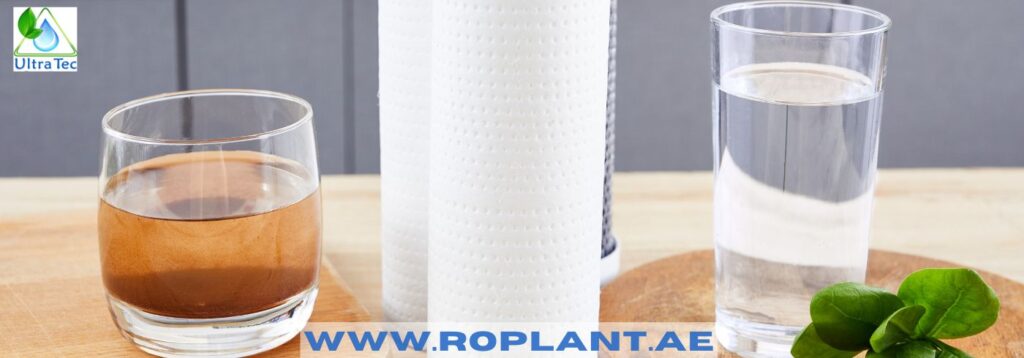Iron Filter For Well Water
Water is an essential resource for our daily lives, and for those who rely on well water, ensuring its quality is paramount. Unfortunately, well water can often contain impurities and contaminants affecting taste, appearance, and usability. One common issue good owners face is the presence of iron in their water. The benefits of using an iron filter for well water treatment company UAE – RO Plant, how it works, and factors to contemplate when selecting the right filter for your needs.
Understanding Well Water Contaminants
Before delving into the specifics of iron filters, it’s crucial to understand the potential contaminants found in well water. Water is susceptible to various impurities, including minerals, bacteria, sediment, and chemicals, and these contaminants can lead to unpleasant odors, discoloration, and health concerns.
The Need for an Iron Filter
Iron is a common culprit when it comes to water issues in well systems. High iron levels can cause water to taste metallic, leave stains on fixtures and laundry, and create clogs in plumbing. Iron can also promote certain bacteria’s growth, further impacting water quality. To combat these issues, using an iron filter becomes crucial.
Effects of Iron in Well Water
Excessive iron in well water can lead to a range of problems. Apart from the aforementioned metallic taste and staining issues, iron can impact the efficiency and lifespan of water instruments, such as dishwashers, washing machines, and water heaters. Iron can also lead to clogs in pipes, reducing water flow and causing plumbing problems.
Benefits of Using an Iron Filter
Installing an iron filter in your well system can provide numerous benefits. Firstly, it improves the overall taste and appearance of your water by removing the iron particles. This means no more unpleasant metallic taste or reddish-brown stains on sinks and clothes. In addition, an iron filter can prolong the lifespan of your appliances and plumbing by preventing the accumulation of iron deposits. Investing in an iron filter guarantees a cleaner and healthier water supply for your household by UltraTec water treatment company UAE.
How Does an Iron Filter Work?
Industrial RO plants in Dubai often incorporate iron filters to eliminate iron particles from well water through filtration. The specific mechanism varies depending on the type of filter used, but the overall goal remains the same: to capture and remove iron impurities, ensuring clean and safe water for industrial applications.
- Filtration Process
Generally, iron filters employ one or more filtration media, such as manganese dioxide or catalytic carbon, to trap iron particles. As water passes through the filter, the media attracts and binds with the iron, preventing it from flowing further. Over time, the filter media may become saturated with iron and require regeneration or replacement. - Types of Iron Filters
Different iron filters are available on the market, including cartridge filters, media filters, and reverse osmosis systems. Cartridge filters are the most basic option and are suitable for low iron levels. On the other hand, media filters use various media layers to capture and remove iron particles effectively. Reverse osmosis systems are more advanced and utilize a semi-permeable membrane to filter out impurities.
Key Factors to Consider When Selecting an Iron Filter
When selecting an iron filter for your well water, it’s essential to consider several factors to ensure optimal performance and longevity.
- Water Flow Rate
The water flow rate in your well system plays a significant role in filter selection. Different filters have varying flow capacities, so choosing one that can accommodate your household’s water usage is crucial. Low flow rates can lead to reduced water pressure and inadequate filtration. - Filter Capacity
The capacity of an iron filter refers to its ability to handle iron levels and water volume. Selecting a filter that matches your specific iron concentration and daily water usage is essential. Choosing an undersized filter may result in frequent filter changes or inadequate iron removal. - Maintenance Requirements
Each iron filter has specific maintenance requirements, including regular backwashing or media replacement. Understanding the maintenance needs of your chosen filter is essential for its long-term effectiveness. Consider your readiness and capability to carry out maintenance tasks or enlist the services of professionals.
Installation and Maintenance
Installing an iron filter for your well water typically involves the following steps:
- Determine the appropriate location for the filter system.
- Please shut off the water supply and depressurize the system.
- Cut into the existing water line and install the filter unit.
- Attach the channel and platform pipes to the filter system.
- Turn on the water collection and fit for any leaks.
Regular maintenance is crucial to ensure the continued efficiency of your iron filter. Some general maintenance tips include:
- Regularly inspect the filter for signs of clogging or damage.
- Follow the manufacturer’s guidelines for backwashing or media replacement.
- Test the water periodically to monitor iron levels and overall water quality.
Cost Considerations
The cost of installing an iron filter for well water depends on various factors, including the type of filter, installation complexity, and ongoing maintenance requirements. While the initial investment may seem significant, it’s important to consider the long-term savings and benefits provided by the filter. An iron filter can save you money in the long run by preventing damage to appliances, reducing plumbing issues, and improving water quality.
Selecting the Appropriate Iron Filter for Your Well
To choose the most suitable iron filter for your well, consider the following steps:
- Research available options and their respective features.
- Evaluate customer reviews and ratings for different filters.
- Consult professionals or water treatment experts for personalized recommendations.
- Consider your specific iron concentration, water flow rate, and budget.
By conducting thorough research and seeking expert guidance, you can acquire the necessary knowledge to make an informed decision and discover the ideal iron filter that effectively addresses your well water concerns.

